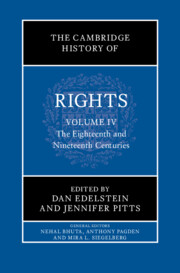Book contents
- the cambridge history of rights
- The Cambridge History of Rights
- The Cambridge History of Rights
- Copyright page
- Contents
- Figures
- Contributors to Volume IV
- General Introduction
- A Note on Translations
- Introduction to Volume IV
- Part I A Revolution in Rights?
- 1 Barbeyrac’s Intervention
- 2 Rights and the Bourgeois Revolution
- 3 Social Rights
- 4 Enlightenment Theories of Rights
- 5 Rights, Property, and Politics
- 6 Antislavery in the Age of Rights
- 7 Enlightenment Constitutionalism and the Rights of Man
- 8 Fundamental Rights at the American Founding
- 9 Declarations of Rights
- 10 The Rights of Women (or Women’s Rights)
- 11 The Image of Rights in the French Revolution
- Part II Postrevolutionary Rights
- Part III Rights and Empires
- Index
- References
1 - Barbeyrac’s Intervention
Grotius, Pufendorf, Locke
from Part I - A Revolution in Rights?
Published online by Cambridge University Press: 22 January 2025
- the cambridge history of rights
- The Cambridge History of Rights
- The Cambridge History of Rights
- Copyright page
- Contents
- Figures
- Contributors to Volume IV
- General Introduction
- A Note on Translations
- Introduction to Volume IV
- Part I A Revolution in Rights?
- 1 Barbeyrac’s Intervention
- 2 Rights and the Bourgeois Revolution
- 3 Social Rights
- 4 Enlightenment Theories of Rights
- 5 Rights, Property, and Politics
- 6 Antislavery in the Age of Rights
- 7 Enlightenment Constitutionalism and the Rights of Man
- 8 Fundamental Rights at the American Founding
- 9 Declarations of Rights
- 10 The Rights of Women (or Women’s Rights)
- 11 The Image of Rights in the French Revolution
- Part II Postrevolutionary Rights
- Part III Rights and Empires
- Index
- References
Summary
This chapter concentrates on the pivotal figure of Jean Barbeyrac, translator extraordinaire of Hugo Grotius, Samuel von Pufendorf, Richard Cumberland, and others. A French Huguenot refugee, Barbeyrac introduced the great Protestant natural law treatises to a French (and ultimately English) audience. But Barbeyrac was much more than a translator. He recast earlier natural law theories around individual conscience and made subjective right the foundation for society and politics. Where Grotius and Pufendorf had conceived of permission or “natural liberty” as the freedom to do whatever the law did not forbid (and thus, not really a right), Barbeyrac insisted a contrario that both natural and civil law tacitly determined – and thus legalized – what was permissible for subjects to do. For Barbeyrac, rights thus took precedence over duties, though only because every action had been made permissible by God. He extended this argument to property, which originated from a God-given natural right to first possession.
- Type
- Chapter
- Information
- The Cambridge History of Rights , pp. 15 - 44Publisher: Cambridge University PressPrint publication year: 2024

